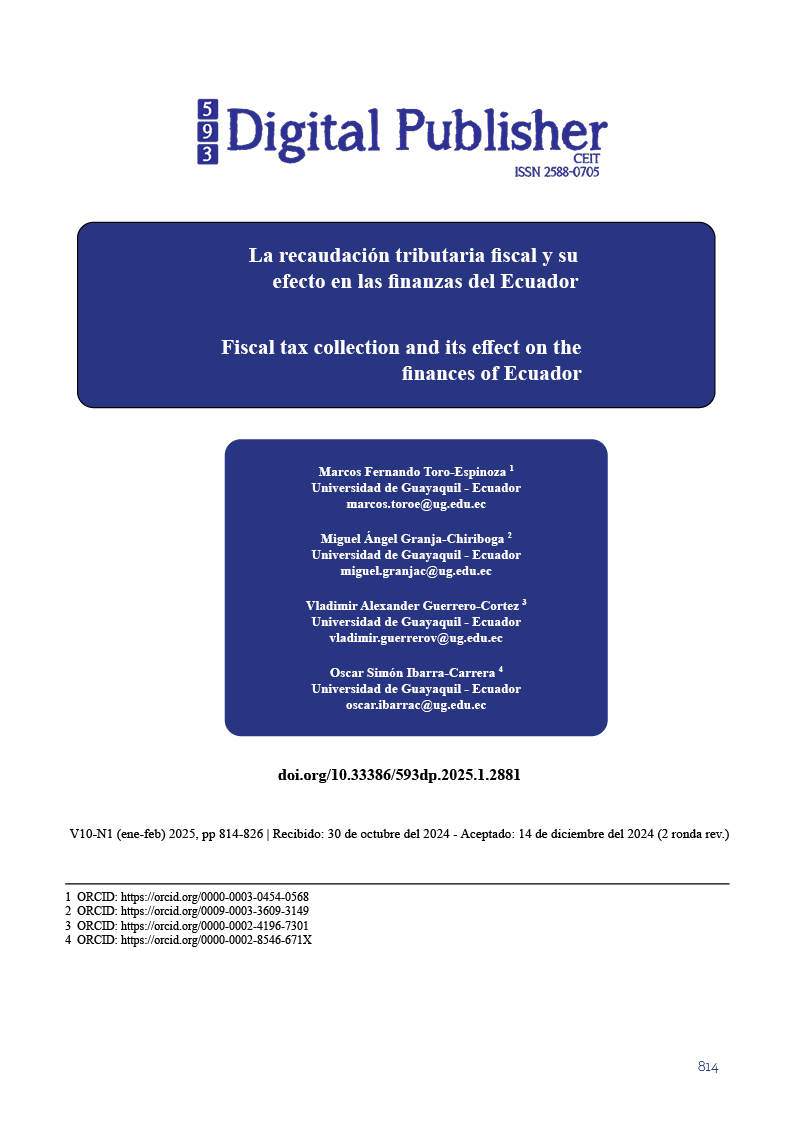Fiscal tax collection and its effect on the finances of Ecuador
Main Article Content
Abstract
The purpose of the research is to analyze Ecuador's fiscal tax collection and its impact on Ecuador's finances, period 2019 to 2023. The variables analyzed are: General State Budget (dependent variable) and tax collection (independent variable). Documentary research is used, because the information is obtained from documented sources, provided by public institutions and from similar studies carried out by other authors; The analysis has a descriptive scope, which allows determining the dependence of the General State Budget variable on the Fiscal Tax Revenue variable, considering taxes the second most valuable source of financing that the State has. The study determines that in the analysis period from 2019 to 2023, the General State Budget was 161,261 million USD, and that 39.31% is financed by tax-fiscal revenues, and that 60.87 % is financed by other income or non-tax financing sources. The analysis allows us to determine that the taxes that contribute the most to the financing of the General State Budget, in the years selected for the analysis, are: the Value Added Tax with 16.02%, the Income Tax with 15.29% and the to special consumption with 1.75%.
Downloads
Article Details

This work is licensed under a Creative Commons Attribution-NonCommercial-ShareAlike 4.0 International License.
1. Derechos de autor
Las obras que se publican en 593 Digital Publisher CEIT están sujetas a los siguientes términos:
1.1. 593 Digital Publisher CEIT, conserva los derechos patrimoniales (copyright) de las obras publicadas, favorece y permite la reutilización de las mismas bajo la licencia Licencia Creative Commons 4.0 de Reconocimiento-NoComercial-CompartirIgual 4.0, por lo cual se pueden copiar, usar, difundir, transmitir y exponer públicamente, siempre que:
1.1.a. Se cite la autoría y fuente original de su publicación (revista, editorial, URL).
1.1.b. No se usen para fines comerciales u onerosos.
1.1.c. Se mencione la existencia y especificaciones de esta licencia de uso.
References
Ámbito Jurídico. (2022). El tributo en el Ecuador en 2022. https://ambitojuridico.com.br/el-tributo-en-el-ecuador/
Cruz, P., Estuardo, R. I., Guanolema, P., & Ramiro, B. I. (2018). Análisis de la Política Tributaria en la Recaudación Fiscal: caso Ecuador. Revista Uniandes Episteme, 5, 674–688. https://revista.uniandes.edu.ec/ojs/index.php/EPISTEME/article/view/1513
Durán-Fernández, A. B., & Torres-Negrete, A. de las M. (2024). Impacto de las reformas tributarias: comportamiento de los contribuyentes y su cumplimiento en Latinoamérica. Revista Metropolitana de Ciencias Aplicadas, 7(Suplemento 1), 71–84. https://doi.org/10.62452/BZDWX554
Fernando Mayorga. (2022). Finanzas Públicas Del Ecuador Panorama General.
H. Congreso Nacional. (2018). Código Tributario del Ecuador. www.lexis.com.ec
Iván Ayón-Ponce, G. I., Artemidoro Zea-Barahona, C. I., Enrique Soledispa-Rodríguez III, X., & Alberto López-Párraga, L. I. (2019). El Presupuesto General del Estado y su aporte a la educación pública en el cantón Paján. Polo Del Conocimiento: Revista Científico - Profesional, ISSN-e 2550-682X, Vol. 4, No. 7, 2019 (Ejemplar Dedicado a: Julio 2019), Págs. 66-76, 4(7), 66–76. https://doi.org/10.23857/pc.v4i7.1022
Luis Alberto Dávila Toro. (2021). Crecimiento Económico y Evolución de las Finanzas Públicas en El Ecuador: Periodo 2008-2020. Economía y Negocios, 12(2), 103–115. https://doi.org/10.29019/EYN.V12I2.974
Mejía, A. M. G., & Segovia, D. (2022). Recaudación Fiscal y Presupuesto General del Estado. X-Pedientes Económicos, 6(16), 138–165. https://ojs.supercias.gob.ec/index.php/X-pedientes_Economicos/article/view/125
Melo-Becerra, L. A., Ramos-Forero, J. E., Gómez, C., Melo-Becerra, L. A., Ramos-Forero, J. E., & Gómez, C. (2022). El presupuesto general de la nación: una aproximación a las partidas de transferencias e inversión. Desarrollo y Sociedad, 2022(90), 153–206. https://doi.org/10.13043/DYS.90.5
Mendoza-Zamora, W. M., García-Ãlava, C. M., Morán-Chilán, J. H., & Muñiz-Salazar, G. E. (2018a). Las Finanzas Publicas en el Ecuador y su incidencia en la economía del país. Dominio de Las Ciencias, 4(4), 284–307. https://doi.org/10.23857/DC.V4I4.841
Mendoza-Zamora, W. M., García-Ãlava, C. M., Morán-Chilán, J. H., & Muñiz-Salazar, G. E. (2018b). Las Finanzas Publicas en el Ecuador y su incidencia en la economía del país. Dominio de Las Ciencias, 4(4), 284–307. https://doi.org/10.23857/DC.V4I4.841
Ministerio de Economía y Finanzas. (2021). Reglamento del Código Orgánico de Planificación y Finanzas Públicas. www.lexis.com.ec
Ministerio de Economía y Finanzas del Ecuador. (2019). Informe semestral de ejecución Presupuesto General del Estado.
Peláez, M. (2016). Los tributos y su aporte al presupuesto general del estado, un análisis comparativo en la república del Ecuador: periodos 2013-2014-2015. Revista Observatorio de la Economía Latinoamericana, 1-13.
Quimis-Plúa, A. E., & Quiñonez-Cercado, M. (2023). LA CULTURA TRIBUTARIA, CONJUNTO DE VALORES Y ACTITUDES PARA EL CUMPLIMIENTO DE LAS OBLIGACIONES FISCALES. REVISTA CIENTÍFICA MULTIDISCIPLINARIA ARBITRADA YACHASUN - ISSN: 2697-3456, 7(12 Ed. esp.), 87–104. https://doi.org/10.46296/YC.V7I12EDESPJUN.0334
UNIR. (2023). Qué son las finanzas y qué tipos existen. Https://Ecuador.Unir.Net/Actualidad-Unir/Que-Son-Finanzas/. https://ecuador.unir.net/actualidad-unir/que-son-finanzas/





